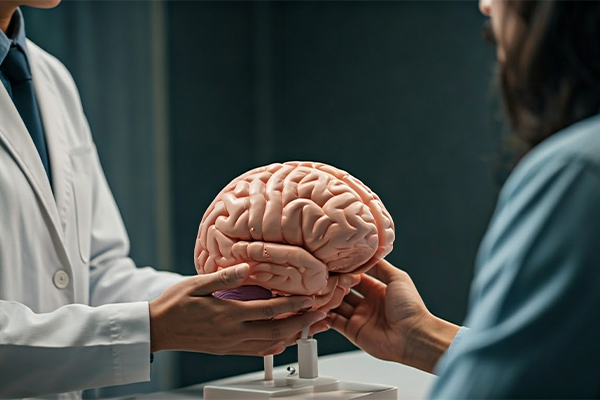
Brain tumours arise when abnormal cells grow uncontrollably in or around the brain. While the exact causes remain largely unknown, research has identified several factors that may increase the risk of developing a brain tumour. Understanding these risk factors is crucial for early detection and prevention. This blog is a compilation of detailed information on all the aspects related to it, offering you deep insights about the causes so that you can empower yourself with the right and accurate medical information.
Synopsis
Genetic and Hereditary Factors
Approximately 5% of brain tumours are linked to inherited genetic syndromes. These are rare genetic conditions and can significantly elevate the risk:
-
Neurofibromatosis Types 1 and 2 (NF1 & NF2): Associated with tumours like schwannomas, meningiomas, neurofibromas and gliomas.
-
Li-Fraumeni Syndrome: Involves mutations in the TP53 gene, increasing the risk of gliomas and other cancers.
-
Von Hippel-Lindau Disease: Leads to various benign and malignant tumours, including those in the brain.
-
Tuberous Sclerosis: Causes benign tumours in multiple organs, including the brain.
-
Turcot Syndrome: Increases the risk of colorectal cancer and brain tumours like glioblastomas.
If you have a family history of these conditions, genetic counselling can help assess your risk.

Radiation Exposure
Exposure to ionising radiation is a well-established risk factor:
-
Medical Treatments: Radiation therapy to the head, especially during childhood, can increase the risk of brain tumours later in life.
-
Environmental Exposure: High-dose radiation from nuclear accidents or occupational settings poses risks.
However, routine diagnostic imaging like X-rays and CT scans uses low radiation levels and is generally considered safe.
Age and Gender
Brain tumours can occur at any age, but certain types are more prevalent in specific age groups:
-
Children: More susceptible to medulloblastomas and other embryonal tumours.
-
Adults: Gliomas and meningiomas are more common.
-
Gender also plays a role; for instance, meningiomas are more frequently diagnosed in women.
Environmental and Occupational Exposures
Some studies suggest links between brain tumours and exposure to certain chemicals:
-
Pesticides and Herbicides: Agricultural workers who use pesticides and herbicides more may face higher risks than those who do not or moderately use them.
-
Industrial Chemicals: Industry workers who work with solvents, vinyl chloride, and petroleum products are also vulnerable.
While evidence is not conclusive, minimising exposure to these substances is advisable.
Mobile Phone Usage
The relationship between mobile phone use and brain tumours remains a topic of research, most studies have not found a definitive link. But there are experts who advocate for the adverse effects of mobile phones on the body, and especially the brain.
Immune System Disorders
Individuals with compromised immune systems are at increased risk of brain tumours:
-
HIV/AIDS Patients: Higher incidence of primary central nervous system lymphomas.
-
Organ Transplant Recipients: Immunosuppressive therapy can elevate risk.
Obesity
Being overweight or obese has been linked to a slight increase in the risk of certain brain tumours, such as meningiomas. Maintaining a healthy weight through diet and exercise may help reduce this risk.
Viral Infections
Certain viruses have been studied for their potential role in brain tumour development:
-
Epstein-Barr Virus (EBV): Associated with primary central nervous system lymphomas.
-
Cytomegalovirus (CMV): Detected in some glioblastoma cases, though its role is not fully understood.
While the majority of brain tumours develop without a known risk factor, understanding the potential risk factors can aid in early detection and prevention. If you have concerns about your risk, especially due to family history or environmental exposures, consult our expert and experienced neurosurgeon in Delhi for personalised advice.
Early Symptoms that Should Not Be Ignored
-
Persistent or Worsening Headaches: Headaches that intensify over time, especially in the morning or when lying down, and do not respond to usual painkillers.
-
Unexplained Nausea or Vomiting: Frequent episodes without a clear cause, often occurring in the morning.
-
Seizures: New-onset seizures or convulsions in individuals without a prior history of epilepsy.
-
Vision Problems: Blurred or double vision, loss of peripheral vision, or sudden visual disturbances.
-
Hearing Changes: Ringing in the ears or hearing loss, particularly in one ear.
-
Cognitive or Memory Issues: Difficulty concentrating, memory lapses, or confusion in everyday tasks.
-
Speech Difficulties: Trouble speaking, understanding language, or finding the right words.
-
Personality or Behavioural Changes: Uncharacteristic mood swings, irritability, or changes in behaviour and personality.
-
Weakness or Numbness: Loss of sensation or strength in the arms or legs, often on one side of the body.
-
Balance and Coordination Issues: Difficulty walking, unsteadiness, or clumsiness.
Conclusion
If you or someone you know experiences these symptoms, it's essential to consult a brain tumour specialist in Delhi promptly. Early evaluation can lead to timely diagnosis and treatment, potentially improving the prognosis.
FAQ's
Diagnosis often involves imaging studies like Magnetic Resonance Imaging (MRI) and Computed Tomography (CT) scans.
Benign tumours can often be completely removed surgically, leading to a cure. Malignant tumours may require a combination of treatments, and while some can be managed effectively, others may have a more guarded prognosis.
Yes, some brain tumours can recur. Regular follow-up with imaging studies is essential to monitor for any signs of recurrence.
Side effects vary based on the treatment:
-
Surgery: Potential risks include infection, bleeding, or neurological deficits.
-
Radiation Therapy: May cause fatigue, hair loss, or skin changes.
-
Chemotherapy: Can lead to nausea, vomiting, or lowered blood counts.
Discussing potential side effects with the treatment team is crucial as they can guide you on how to manage them.





















 5 Min Read
5 Min Read



















